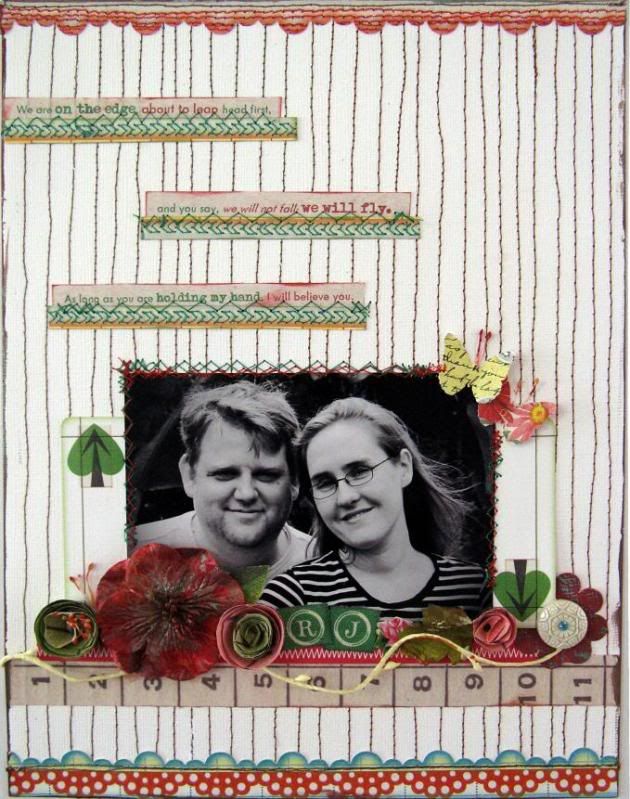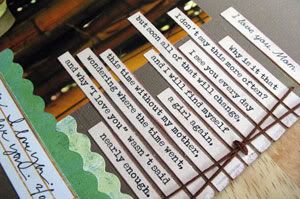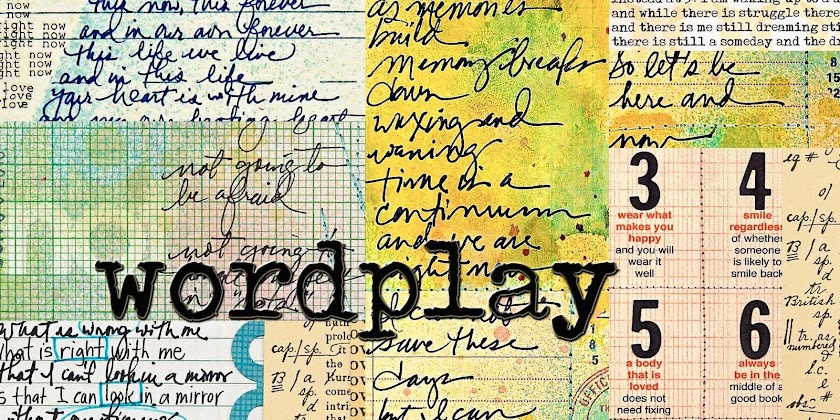Journal Moment with Jill
May 2009
In Defense of Journaling
We tell stories because, in order to cope with the present and to face the future, we have to create the past, both as time and space, through narrating it. -- W.F.H. Nicolaisen
Robert Frost described his chosen form of expression, poetry, as
“a way of remembering what it would impoverish us to forget.” The same can be said of any form of expression that seeks to unite words and images, emotions and memories. The “scraps” of memory that exist in our albums come together page by page, moment by moment. They document a story that has neither a beginning nor an ending; it is
a chapter in time, a story among stories.
Imagine, however, a moment suspended in time within a photograph, visually present, but voiceless. If you do not tell the story or seek the words to release this moment from the “frame” that contains it, who will? Are the patterned papers and accents that surround your photo enough to help someone who does not share the memory to infer its meaning? How do the pages of your albums share who you are, who and what you love, all that you value? Do they present a realistic or idealistic view of your world? How do they give voice to experience?
How do you “frame” memory within your pages?Writer Angela Carter once claimed, “As the past becomes more and more unlike the present…more and more we need to know who we were in greater and greater detail in order to be able to surmise what we might be.” Even if you create your layouts for you, with no audience in mind, know that
memory is unreliable. You may create for the “you” of today, but what will make these pages meaningful for the “you” of tomorrow? Words.
The power of your voice. A belief that you have something to say, a story to tell…even if no one is listening…yet.
Sometimes those words can be difficult to find, and many of us add journaling on our layouts – if indeed, we ever add it – as an afterthought. While there is nothing wrong with relegating journaling to the end of one’s creative process,
it is important that journaling be given the same respect and care that went into composing and editing the photos, selecting and arranging the papers and accents, using special techniques, and designing the page itself. Adding words just for the sake of adding words isn’t the point.
Choose your words. Make them count. Make them meaningful.
How exactly does one do this?
The answer really is simple:
you need to care about what you say. If you don’t feel connected to the words that you commit to paper, then revise, revise, revise.
There are several
strategies for bridging the journaling “gap” – the distance between images and words.
-
Embrace a writing process. You are less likely to be dissatisfied with your journaling if you don’t write “blind”. Just as you “compose” a layout, compose your journaling as well.
Don’t underestimate the power of drafting and revising. I usually “unload” on computer or in a notebook (and sometimes on a piece of scrap paper), getting out all of the thoughts in my head. I look back at what I’ve written, searching for a few key phrases, words, or themes that catch my attention. I then try a new approach, using what I noticed from the first try as a springboard for another draft. By the second or third draft, my journaling is much more focused and cohesive – and much more powerful. Fear of “messing up” can cripple us, but there is no “messing up” if you give yourself room to be messy in draft form, and then clean it up later. I often compose on a computer, and then write directly on the layout by hand, as I did with this layout:

-
Link the content of your journaling to the image itself, and/or to the elements on your layout. Build on a recurring theme. Try to share something that isn’t understood by simply looking at the photo. For instance, in the layout below, I could have just labeled the photo, "Rob and Jill" and added the date. However, the journaling that I added is about what is happening between "Rob and Jill," about the changes that are occurring, and the way that I am feeling about taking a leap. The idea of "taking a leap" led me to use a metaphor in my journaling.

-
Write with a specific person in mind. This has drastic effects on the tone of your writing. Even if the page is not intended for a particular person, using the second person pronoun, “you,” establishes a greater degree of intimacy on the page. It will also push you to make word choices that more fully express the emotion that you feel toward this person. You can even write to yourself.
-
Avoid clichés. A cliché is an overused expression. While you may think that it says all that you need to say, it often does not; it does not speak to the specificity of experience. You are an individual, and your memories and emotions do not deserve to be documented in generic phrasings. In a first draft, clichés often appear. As you revise, try to identify them and rephrase them using more precise language. If you absolutely can’t avoid using a cliché, at least try to follow up with a few sentences or phrases that elaborate on what you mean. In a layout that I made for my mom, "I Love You, Mom," I knew that the title might come across as somewhat...predictable. The journaling clarifies that title; while other people may say "I love you, Mom" comfortably and easily all the time, I sometimes struggle with it...and I don't want things to be that way.

- If you do save journaling for last, and you are having trouble generating ideas,
walk away from a layout for an hour, an afternoon, a day, or more. Spend some time thinking about what you have created, and let the connections germinate in your mind. Whether you realize or not, at this time, you will be composing a mental “draft”, reflecting on the meaningful connections to what you have created and how you want to express those connections using your voice.
Do you have other strategies for establishing meaningful connections between words and images on your layouts? If so, please share!






